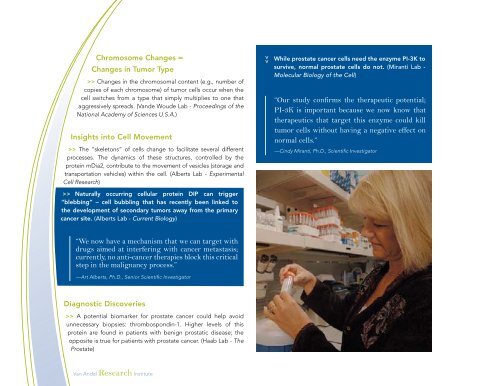2007 Annual Report
Create successful ePaper yourself
Turn your PDF publications into a flip-book with our unique Google optimized e-Paper software.
Chromosome Changes =<br />
Changes in Tumor Type<br />
>> Changes in the chromosomal content (e.g., number of<br />
copies of each chromosome) of tumor cells occur when the<br />
cell switches from a type that simply multiplies to one that<br />
aggressively spreads. (Vande Woude Lab - Proceedings of the<br />
National Academy of Sciences U.S.A.)<br />
Insights into Cell Movement<br />
>> The “skeletons” of cells change to facilitate several different<br />
processes. The dynamics of these structures, controlled by the<br />
protein mDia2, contribute to the movement of vesicles (storage and<br />
transportation vehicles) within the cell. (Alberts Lab - Experimental<br />
Cell Research)<br />
>><br />
While prostate cancer cells need the enzyme PI-3K to<br />
survive, normal prostate cells do not. (Miranti Lab -<br />
Molecular Biology of the Cell)<br />
“Our study confirms the therapeutic potential;<br />
PI-3K is important because we now know that<br />
therapeutics that target this enzyme could kill<br />
tumor cells without having a negative effect on<br />
normal cells.”<br />
—Cindy Miranti, Ph.D., Scientific Investigator<br />
>> Naturally occurring cellular protein DIP can trigger<br />
“blebbing” – cell bubbling that has recently been linked to<br />
the development of secondary tumors away from the primary<br />
cancer site. (Alberts Lab - Current Biology)<br />
“We now have a mechanism that we can target with<br />
drugs aimed at interfering with cancer metastasis;<br />
currently, no anti-cancer therapies block this critical<br />
step in the malignancy process.”<br />
—Art Alberts, Ph.D., Senior Scientific Investigator<br />
Diagnostic Discoveries<br />
>> A potential biomarker for prostate cancer could help avoid<br />
unnecessary biopsies: thrombospondin-1. Higher levels of this<br />
protein are found in patients with benign prostatic disease; the<br />
opposite is true for patients with prostate cancer. (Haab Lab - The<br />
Prostate)<br />
Van Andel Research Institute

















